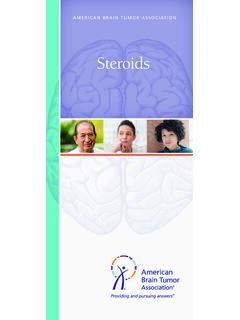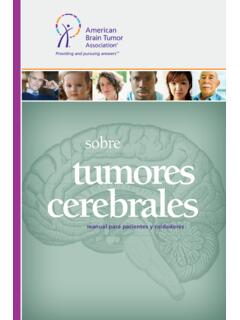Transcription of Neuropsychiatric Symptoms of Brain Tumors
1 Neuropsychiatric Symptoms ofBrain Tumors 1 ABOUT THE AMERICAN Brain tumor ASSOCIATIONF ounded in 1973, the American Brain tumor Association (ABTA) was the first national nonprofit organization dedicated solely to Brain tumor research. The ABTA provides comprehensive resources that support the complex needs of Brain tumor patients and caregivers, as well as the critical funding of research in the pursuit of breakthroughs in Brain tumor diagnoses, treatments and learn more about the ABTA, visit A special thanks to Phyllis Drees, member of the We are the Wives of GBM and This is Our Story support community, for recognizing the need for more support and resources surrounding this topic and for working closely with the ABTA to develop this gratefully acknowledge Dr.
2 Michael Parsons, Dr. Erin Dunbar, Dr. Sandeep Vaishnavi, Dr. Burt Nabors, members of the We are the Wives of GBM and This is Our Story support community, Mary Laubacher, and Dr. Torey Fuller for their contributions. This publication is not intended as a substitute for professional medical advice and does not provide advice on treatments or conditions for individual patients. All health and treatment decisions must be made in consultation with your physician(s), utilizing your specific medical information. Inclusion in this publication is not a recommendation of any product, treatment, physician or 2019 ABTAREPRODUCTION WITHOUT PRIOR WRITTEN PERMISSION IS PROHIBITED2 Neuropsychiatric Symptoms of Brain TumorsINTRODUCTION Brain Tumors and their treatments can cause a number of mood, behavioral or cognitive Symptoms that present or overlap like mental health disorders.
3 These are called Neuropsychiatric Symptoms , also known as neurobehavioral Symptoms . If untreated, these Symptoms can cause significant change in the patient s personality, mood, and behavior. In extreme cases, these changes can lead to situations in which the patient, their caregiver, loved ones or others are placed at following is a list of common psychiatric Symptoms that can be experienced by those diagnosed with a Brain tumor :> Abusive behavior (verbal, emotional, physical)> Aggression: Hostile or violent attitude or behavior> Anger: A strong feeling of displeasure and hostility> Anxiety: Excess fear or worry> Apathy: A lack of concern, interest, motivation> Confusion: A lack of orientation or not knowing what to do next > Coping (adjustment) difficulty.
4 Difficult emotions ( , sadness, worry) or behaviors that arise in response to stressors> Delirium: A sudden change in mental status, including confusion> Delusion: A belief that contradicts reality> Depression: A group of Symptoms that includes sadness and loss of interest in pleasurable activities3> Flight Risk: A tendency to leave one s environment suddenly without notifying others> Grandiosity: A sense of superiority; sometimes associated with mania/hypomania> Hallucination: Hearing, seeing, or smelling something that isn t there> Impulsivity/Disinhibition ( , spending, sexual behavior): Acting with little or no forethought or consideration of consequences; lack of restraint> Insomnia and sleep-wake cycle disorder: Can include staying awake at night or sleeping in the day> Mania/Hypomania: A state of inflated self-esteem, decreased need for sleep, increase in goal-directed activity, difficulty maintaining attention, racing thoughts, and excessive involvement in pleasurable activities.
5 Hypomania is a milder form of mania.> Memory loss: From transient to profound (like dementia)> Profound personality change: Exaggeration of underlying personality traits or the development of new ones> Rage: Violent, uncontrollable anger> Paranoia: An unwarranted belief that others intend to cause harm, sometimes accompanied by unreasonable self-importance> Psychosis: A general term for loss of contact with reality; may include delusion or hallucination> Social withdrawal: Less involvement in social activities> Suicidal behavior: Can include a number of behaviors including talking about wanting to die and gestures toward harming oneself> Violent behavior: Physical, sexual, or emotional attacks4 IMPACT ON PATIENTSP atients who experience Neuropsychiatric Symptoms related to a Brain tumor may experience consequenc-es beyond the Symptoms themselves.
6 They may miss treatment appointments, place themselves in danger doing things they can no longer do safely ( , driving, handling firearms), spend money recklessly, avoid or confuse medication doses, or break ties with needed social ON CAREGIVERS AND OTHER LOVED ONES A person s Neuropsychiatric Symptoms related to a Brain tumor can be incredibly distressing for loved ones. The following are examples of how Neuropsychiatric symp-toms can affect family and friends:> Grief: When a patient s personality and/or behavior changes, his/her loved ones lose the person they knew.> Family roles: A family or friend loses the loved one they knew.
7 They must decide if -- then try to figure out how -- to begin a new relationship with the patient as they are. For example, a patient who used to take a lead role in the family finances and decisions becomes passive, child-like, or too impaired to participate. A spouse, sibling or child may start to fulfill those roles.> Physical safety: The patient can act in ways that jeopardize the safety of their loved ones or others in the community. For example, patients can become violent or drive motor vehicles when prohibited by a doctor.> Financial security: A patient who is manic or impulsive can spend family money recklessly or cause damage to property.
8 > Emotional well-being: Some patients experience personality change or other Symptoms which cause them to act in ways that are different from how they used to be. They may treat loved ones in a manner that is cold, mean, or even abusive, creating risk for emotional > Damaged relationships: A patient may harm or end previously cherished relationships through neglect, abuse, or infidelity. POSSIBLE CAUSES Neuropsychiatric Symptoms related to a Brain tumor often have several causes. They are often a combination of:> tumor location ( frontal lobes and medial frontal structures)> Injury caused by the tumor and its treatments in the anatomic area affected by the tumor > Age and general health> Other health issues and their treatments.
9 Common examples include:> Corticosteroid medications ( , dexamethasone)> Anti-epileptic medications ( , levetiracetam)> Biochemical and electrical changes in Brain due to tumor > Changes in Brain due to treatment side effects> Elevated intracranial pressure> Changes in cytokine levels> Family history of psychiatric diseasePROFESSIONALS WHO CAN HELP Professional intervention may be needed if you or your loved one is experiencing Neuropsychiatric Symptoms . These are the types of professionals who can help:> Neuropsychiatrist: A psychiatrist who diagnoses and treats disorders of the Brain which cause mood, behavioral or cognitive Symptoms > Behavioral Neurologist: A neurologist who specializes in behavioral and cognitive functions of the Brain > Behavioral Oncologist: An oncologist trained to care for the emotional and behavioral health needs of 6patients and their families; often available at cancer centers > Counselor or Therapist: Professional who provides counseling or therapy.
10 Can be a clinical social worker or clinical psychologist> Psychiatrist: A physician who diagnoses and treats mental health issues such as depression or other mood disturbances> Neuro-Oncologist: A doctor who specializes in cancer of the Brain and the rest of the nervous system and is typically the primary coordinator of the patient's care team> Medical Oncologist: A doctor who has special training in diagnosing and treating cancer in adults using chemotherapy, hormonal therapy, biological therapy, and targeted therapy> Neurologist: A doctor who diagnoses and treats disorders of the nervous system> Neuropsychologist: A psychologist who specializes in understanding how cognitive, emotional, and psychological functioning work in the Brain > Religious and Spiritual Leaders: Many religious leaders have training in counseling and can offer guidance based on your spiritual needsEVALUATION & TREATMENT There are many ways in which psychiatric Symptoms can be evaluated and treated.






